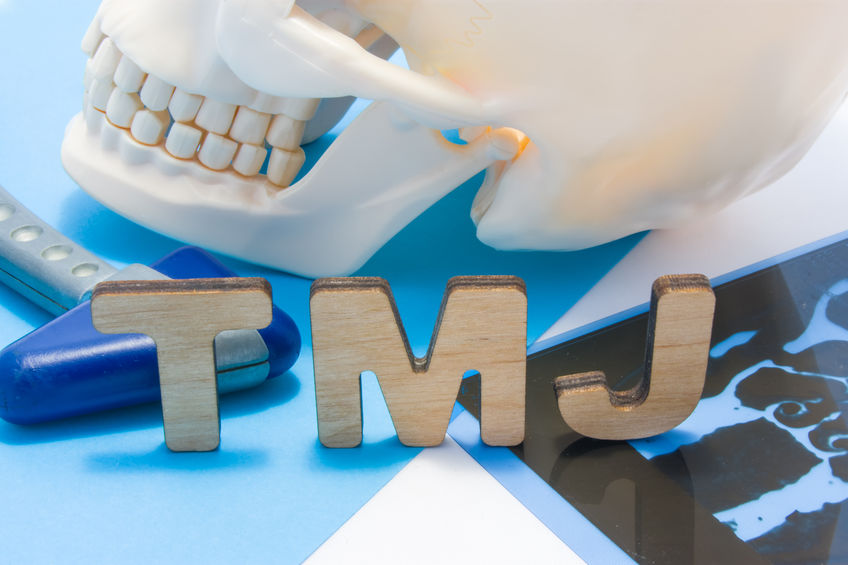What Are TMJ Disorders?
TMJ (temporomandibular joints) are the 2 joints that connect your lower jaw to your skull. TMJ disorders are a family of problems related to the complex jaw joint. These symptoms occur when the joints of the jaw and the surrounding chewing muscles (muscles of mastication) do not work together as they should. Since some types of TMJ problems can lead to more serious conditions, early detection and treatment is important.
If your TMJ disorder has caused problems with how your teeth fit together, you may need treatment such as bite adjustment (equilibration), orthodontics with or without jaw reconstruction, or restorative dental work.
Surgical options such as arthroscopy and open joint repair restructuring are sometimes needed, but are reserved for severe cases. TMJ surgery is not considered unless the jaw can’t open, is dislocated, has severe degeneration, pain affecting the your quality of life, or you have undergone appliance treatment unsuccessfully.
Contact our office for more information about the TMJ treatment options we can provide in Cleveland TN.

Frequently Asked Questions About TMJ Disorders
Q: What is TMJ?
A: TMJ stands for temporomandibular joint. You have one on either side of your face attaching your jaw to your skull. The muscles surrounding this joint work to allow your mouth to open and close. Sometimes these joints don’t move as they should or get out of alignment, causing issues like TMJ disorder.
Q: What are the signs and symptoms of TMJ disorder?
A: Symptoms of TMJ issues include pain in one or both jaw joints, ear aches, pain when chewing, stiff muscles surrounding the jaw, pain in the face or neck, and changes in bite/how the teeth fit together.
Q: Does a popping sound when moving the jaw mean someone has TMJ disorder?
A: If clicking and popping of the jaw is accompanied by other symptoms, it could be linked to TMJ disorder; however, many people’s jaws make noise, and that alone doesn’t signify a problem.
Q: What causes TMJ?
A: The cause of TMD (temporomandibular disorder) is not always clear. Often it is caused by slipped cartilage that surrounds the jaw. Other potential causes include injury or dislocated jaw, misaligned teeth and/or jaws, grinding of the teeth, and arthritis, which can damage cartilage in the joint.
Q: Who usually gets TMJ disorder?
A: Up to 15% of adults suffer from TMJ disorder symptoms, and more women than men deal with this condition.
Q: Can orthodontic braces cause TMD?
A: Some people believe that braces or other orthodontic treatments can cause TMJ trouble; however, there is no research that supports that orthodontic braces bring on TMJ symptoms.
Q: How does an oral surgeon diagnose TMD?
A: If you present with symptoms of TMD, your oral surgeon will look for signs of jaw irritation or inflammation, listen for clicking and grinding sounds, and look into the range of motion of your jaw– how far it can move in any direction. The oral surgeon may also need x-rays or other imaging to get a clearer picture of the affected joint.
Q: What options exist for TMJ treatment?
A: Some easy, first-line-of-defense remedies for TMJ include over-the-counter pain relievers, cold or hot compress on the jaw area, consumption of softer foods, limiting jaw movement when plausible, exercises that stretch and relax the jaw, and limiting activities like gum chewing and nail biting that can exacerbate symptoms.
Q: Does stress/anxiety affect TMJ symptoms?
A: Teeth grinding and jaw clenching often accompany stress and anxiety, and can cause jaw problems. Therefore, stress management can help minimize the TMJ symptoms a patient experiences. Your oral surgeon may suggest exercise, meditation, and hobbies that can help reduce stress and help mitigate jaw pain and other issues caused by TMJ flare ups.
Q: What other TMJ treatments are available for more severe cases?
A: If you’re still experiencing issues with TMD, your oral surgeon might recommend some of the following options for treatment:
- A mouthguard to help protect your teeth from excessive grinding and clenching
- Orthodontic braces to fix a problematic, uneven bite
- Injections of Botox into the jaw muscles to help manage pain and promote relaxation
Q: Are surgeries ever required as a TMJ treatment?
A: If your symptoms are severe enough, your Cleveland oral surgeon might recommend surgery to address a structural problem of the jaw. In some cases the surgeon can fix the joint problem, and in others, replace the joint altogether.
If you are suffering from the symptoms of TMJ and are seeking TMJ treatment in the Cleveland, TN or Chattanooga areas, our team at Ocoee Oral Surgery would love to help you get the relief you’re looking for. Get in touch with our office today to set up a consultation. You don’t have to just deal with the symptoms. Let’s work together to find a treatment plan that works for your specific case.

